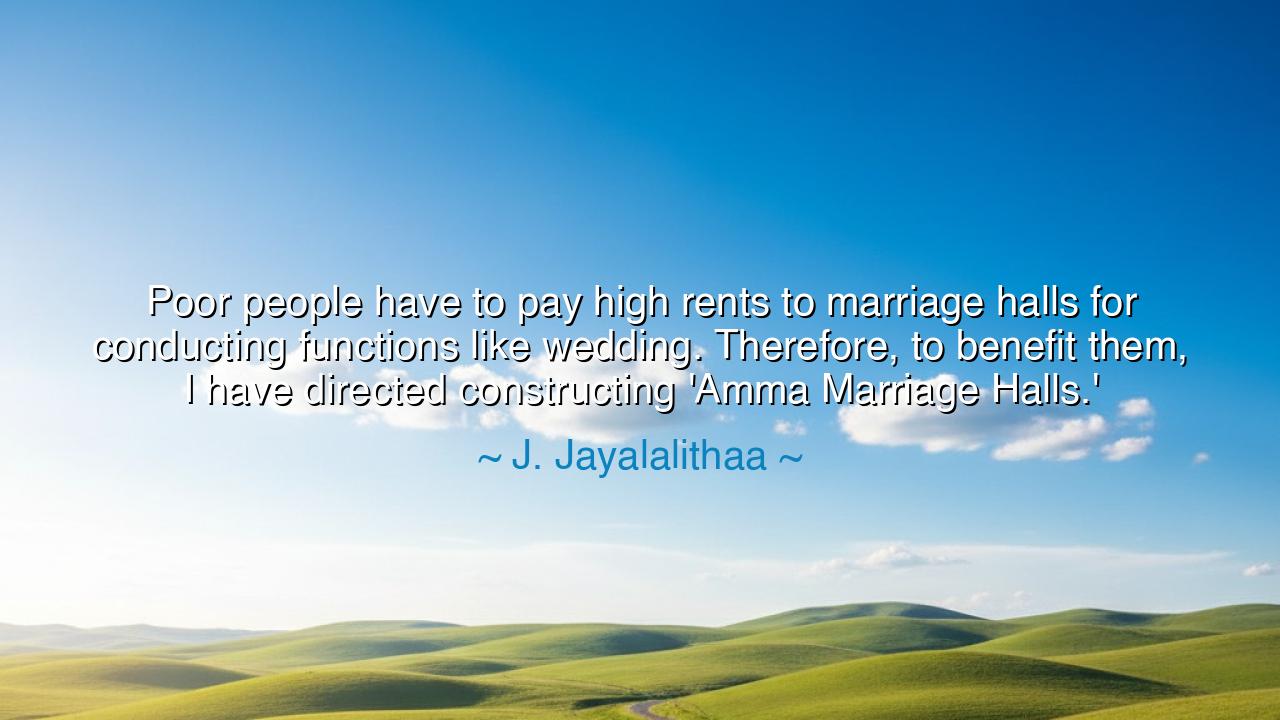
Poor people have to pay high rents to marriage halls for
Poor people have to pay high rents to marriage halls for conducting functions like wedding. Therefore, to benefit them, I have directed constructing 'Amma Marriage Halls.'






Hearken, O children of justice and benevolence, to the proclamation of J. Jayalalithaa, whose heart sought to ease the burden of the common people. She spoke of the weight that falls upon the poor, compelled to pay high rents for marriage halls to mark the sacred rites of union and celebration. In her wisdom, she perceived that the joy of such milestones should not be shackled by the chains of expense, and thus she ordained the creation of Amma Marriage Halls, spaces where dignity and festivity might flourish without oppression.
In this pronouncement lies the eternal truth: leadership is measured not by grandeur, but by the care bestowed upon those most in need. Across the ages, rulers who sought the welfare of their people have left enduring legacies. Recall Emperor Ashoka of India, who, after witnessing the suffering of war, dedicated himself to the welfare of his subjects—constructing hospitals, planting trees, and creating spaces for the well-being of all. Jayalalithaa’s halls echo this spirit: a tangible manifestation of compassion, turning policy into sanctuary.
The teaching of this act stretches beyond mere architecture; it illuminates the philosophy that equity and celebration are intertwined. Marriage, a sacred bond, binds not only hearts but communities, and to deny the poor the means to honor it is to cast shadows upon the social fabric. By erecting spaces of accessibility, Jayalalithaa transformed the ritual of union into a universal right, reminding us that justice must walk hand in hand with ceremony.
Consider too the story of public commons and guilds in medieval Europe, where communities shared spaces for festivals, weddings, and gatherings, ensuring that life’s pivotal moments were marked collectively, free from the burdens of exclusivity. In this, as in Jayalalithaa’s initiative, lies the lesson: society flourishes when its members are granted equal access to the rites that sanctify human existence. Celebration, like air and water, is a necessity of life, not a privilege of the wealthy alone.
Thus, O observers of mortal governance, take heed: true wisdom is found in the care of the humble and overlooked, in the transformation of policy into joy, in turning structures of stone into vessels of hope. Jayalalithaa’s Amma Marriage Halls are more than edifices; they are symbols of equity, foresight, and love, demonstrating that leadership shines brightest when it lifts the burdens of those who walk in shadows.
Let the children of future generations remember this lesson: the worth of a ruler, and indeed of any soul, is reflected in the lives uplifted, the ceremonies made possible, and the hearts unburdened. In every wedding celebrated within these halls, the spirit of compassion and justice endures, a beacon of the power of action guided by empathy and foresight.






BUBao Uyen
Jayalalithaa’s idea of creating 'Amma Marriage Halls' to help the poor with wedding costs raises an interesting question about the role of the government in supporting family events. It makes me wonder, though: Is this enough to solve the larger issue of financial inequality? Are there other areas where the government could intervene to reduce costs for low-income families and help them celebrate significant moments without getting into debt?
NMNgoc My
I find J. Jayalalithaa’s approach to providing affordable marriage halls for poorer families admirable. It’s an interesting example of a politician addressing a very real concern of many people. But I wonder—how sustainable is this model in the long term? Will these 'Amma Marriage Halls' be able to maintain quality while keeping prices low? And what other areas of social support should governments focus on to alleviate economic burdens like this?
VNAnh vu Nguyen
This quote makes me think about the economic pressures that weddings place on families, especially those with fewer resources. The idea of constructing 'Amma Marriage Halls' seems like a smart way to reduce financial strain and make special events more accessible. But does this solution address the deeper problem of rising living costs in general, or is it just a temporary fix for an ongoing issue? What other support systems could be implemented to assist low-income families?
LDLinh Dao
J. Jayalalithaa’s initiative to build 'Amma Marriage Halls' for the poor is an interesting solution to a common financial burden. It highlights the economic challenges that many face when trying to hold significant family events like weddings. How impactful do you think such a move could be for lower-income communities? Could this model of affordable event spaces be replicated elsewhere to help other communities struggling with similar issues?